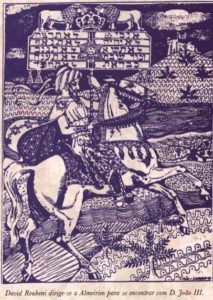 David Reubeni was born around 1490 in a place called Chabor – the location of which is disputed to this day, though the best evidence points towards Afghanistan, where certain Pashtun tribes still practice Jewish customs (despite being officially Muslim) and speak of a folk hero named Daoud Roubani. In 1522, Reubeni left on a long journey around the world, going to India, Africa, throughout the Ottoman Empire and Europe. Along the way he claimed to be a messenger from the distant Jewish Kingdom of Chabor. His wisdom, piety, and military genius were evident to all who met him, including the Pope and a host of other rulers and dignitaries. To these leaders he proposed a plan to conquer Israel from the Ottomans through a Jewish-Christian alliance. The plan gained a lot of steam, and even appeared to be manifesting at one point. Pope Clement VII supported it, and King Juan III of Portugal promised eight ships and 4000 cannons. However, the messianic fervour that resulted inspired some Jews to rebel against the Inquisition, causing the loss of key allies. Meanwhile, skeptical Jews joined anti-Semities and opponents in preventing what they felt was another “false messiah”, though Reubeni never claimed to be one. It was Emperor Charles V of Spain who eventually had Reubeni and his key supporters arrested. They were assigned to the Inquisition and never heard from again. Reubeni’s cause and time of death are unknown, though his diary survives in Oxford (a second copy was destroyed by the Nazis). His story is as fascinating as it is mysterious: a man with an unknown beginning and an unknown end, hailing from a lost Jewish kingdom, who nearly succeeding in reestablishing a Jewish state in Israel four centuries before the Zionist movement.
David Reubeni was born around 1490 in a place called Chabor – the location of which is disputed to this day, though the best evidence points towards Afghanistan, where certain Pashtun tribes still practice Jewish customs (despite being officially Muslim) and speak of a folk hero named Daoud Roubani. In 1522, Reubeni left on a long journey around the world, going to India, Africa, throughout the Ottoman Empire and Europe. Along the way he claimed to be a messenger from the distant Jewish Kingdom of Chabor. His wisdom, piety, and military genius were evident to all who met him, including the Pope and a host of other rulers and dignitaries. To these leaders he proposed a plan to conquer Israel from the Ottomans through a Jewish-Christian alliance. The plan gained a lot of steam, and even appeared to be manifesting at one point. Pope Clement VII supported it, and King Juan III of Portugal promised eight ships and 4000 cannons. However, the messianic fervour that resulted inspired some Jews to rebel against the Inquisition, causing the loss of key allies. Meanwhile, skeptical Jews joined anti-Semities and opponents in preventing what they felt was another “false messiah”, though Reubeni never claimed to be one. It was Emperor Charles V of Spain who eventually had Reubeni and his key supporters arrested. They were assigned to the Inquisition and never heard from again. Reubeni’s cause and time of death are unknown, though his diary survives in Oxford (a second copy was destroyed by the Nazis). His story is as fascinating as it is mysterious: a man with an unknown beginning and an unknown end, hailing from a lost Jewish kingdom, who nearly succeeding in reestablishing a Jewish state in Israel four centuries before the Zionist movement.
Words of the Week
A person must seek out a spiritual livelihood with all the intensity of his strength, just as he seeks a material livelihood.
– The Lubavitcher Rebbe (Hayom Yom, Cheshvan 14)
